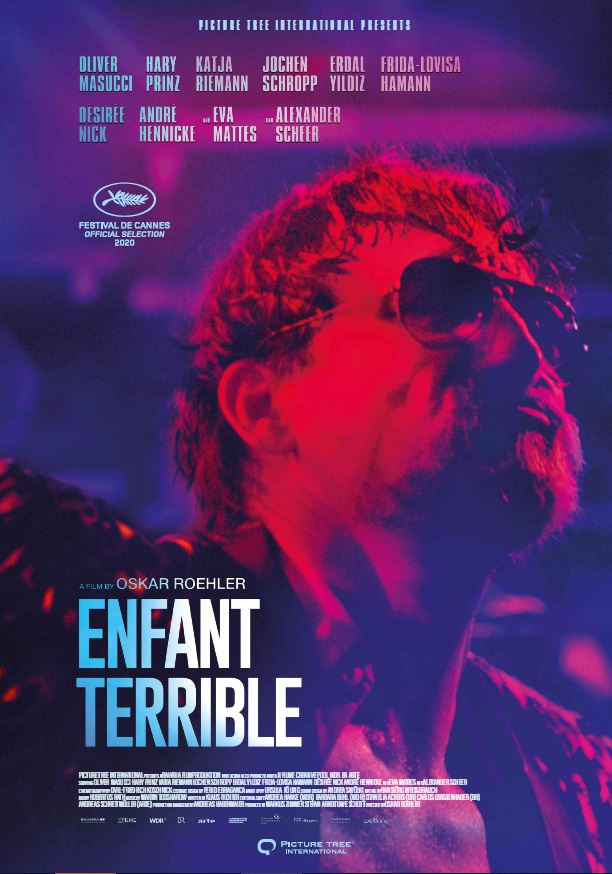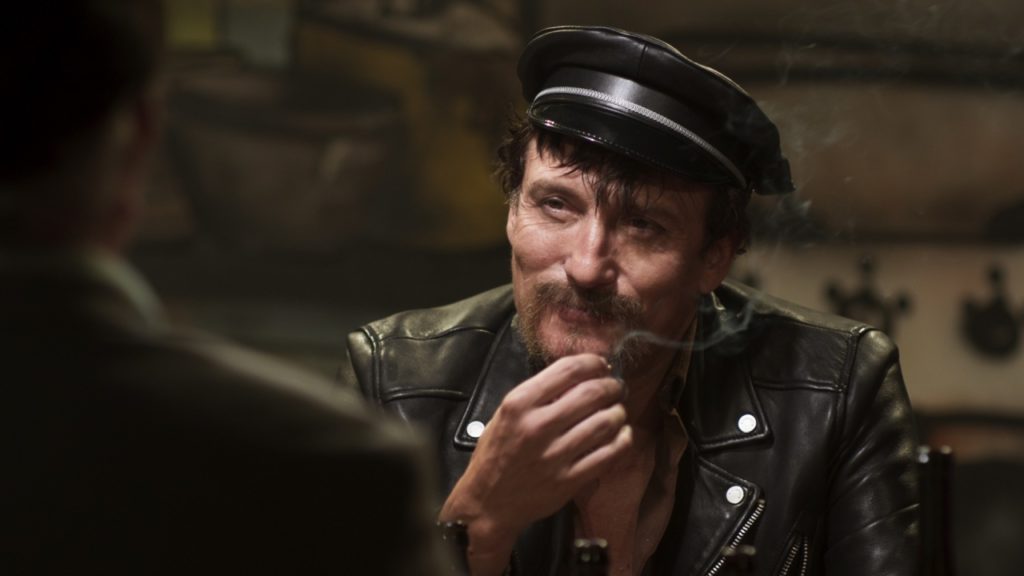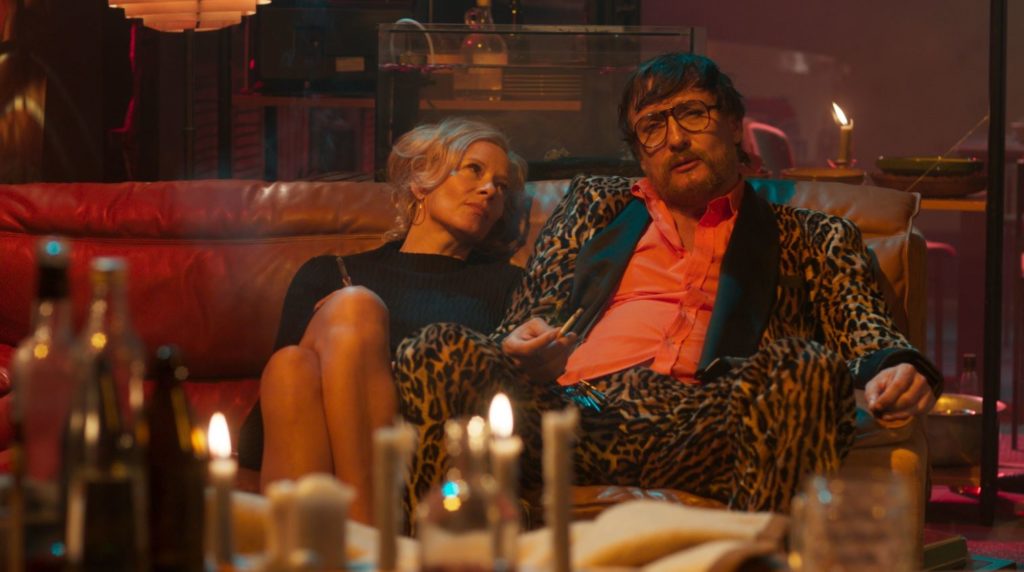怪异天才
Enfant Terrible

导演|奥斯卡·罗勒
编剧|克劳斯·里克特
主演|奥利弗·马苏奇 / 卡蒂娅·里曼 / 弗里达·洛维萨·哈曼
制片人|马库斯·季默 / 史提芬·安特 / 乌瓦·舒特
摄影|卡尔-弗里德里希·科斯尼克
类型|传记
时长|134分钟
完成时间|2020年
对白语言|德语 / 法语 / 英语
字幕|中文
地区|德国
制片公司|巴伐利亚电影公司 / X Filme制片公司 / 西德广播公司 / 巴伐利亚广播公司 / 德法公共电视台
故事梗概
1967年,22岁的赖纳·维尔纳·法斯宾德登上慕尼黑“反剧院”的舞台,而且很快成为该剧团的负责人,没有人怀疑这位无所顾忌的无名小辈会成为战后最重要的德国电影人之一。他充满激情和动力的性格很快吸引了一群由演员、自恋者和追求者组成的粉丝团。仿佛意识到了自己的生命有限,他近乎疯狂地创作了一部又一部电影。虽然法斯宾德激进地贯彻了他的创作理念以及他对社会和人的看法,但他在专业和私人生活方面都呈现了两极分化的状态。
尽管早期遭遇挫折,但他的许多电影在全世界最著名的电影节上取得了突破,并受到观众、影评人和其他同行的欢迎和憎恨。他的愤怒,他对爱的渴望,以及他的自我剥削,同时也强加在他周围的每个人身上,使他成为最令人难忘和激进的电影导演,一个“坏孩子”。
导演介绍

奥斯卡·罗勒以编剧的身份开始了他的职业生涯,并凭借他的第二部作品《无处可逃》(2000)崭露头角,这部影片是关于他母亲的私人肖像,在戛纳电影节导演双周单元首映,并获得了德国电影奖最佳影片奖。他的其他获奖电影包括:《焦虑》(2003,柏林电影节主竞赛单元提名),《求爱三兄弟》(2004,威尼斯电影节地平线单元提名),改编自米歇尔·乌埃勒贝克同名小说的《基本粒子》(2006,柏林电影节主竞赛单元提名),《犹太人苏斯:无良电影》(2010,柏林电影节主竞赛单元提名)是他评价最两极分化的作品之一,《生命之源》(2012,卡罗维发利电影节主竞赛单元提名),以及《佣人变奏曲》(2018)。《怪异天才》是奥斯卡·罗勒的最新作品,并向最传奇和激进的德国电影人之一赖纳·维尔纳·法斯宾德致敬。
导演阐述
我看的第一部法斯宾德电影是《四季商人》,当时我12岁,是在寄宿学校里的一座能容纳大约20人的家庭影院。这部电影像子弹一样击中了我的心,从那时起,我就一直期盼着法斯宾德的下一部电影。等待的时间并不长。几乎每隔六个月,就会有短小精悍的、怪诞而深刻的新作问世,它们把扭曲的镜子对准20世纪70年代早期的德国社会、小资产阶级和反动分子,对于十来岁的我来说,它们给我留下了深刻的印象。这是我以前从未见过、也从未想过的德国现实,而这些电影给了我去了解这些现实的工具和手段。因此,我很早就开始了写作的尝试。法斯宾德的电影对近于荒废的德国电影业来说是一大福音。19岁的时候,我终于去了柏林,去探寻正在崩溃的现代结构,以及传奇的法斯宾德——他当时已经三十多岁了,声名鹊起。我很快就游历了那些可以接近我的偶像(即与他合作的明星)的地方,比如英格丽·卡文、库尔特·拉布、福尔克·施彭勒等人,他们常常在巴黎酒吧和萨维尼广场附近的百慕大三角地区买醉,或是庆祝他们的奢侈派对,我一开始不敢进去,只能“把鼻子贴在玻璃上窥探”。后来我认识了他们中的一些人,并有幸和他们一起合作拍摄。法斯宾德和他的朋友们之所以如此出名,是因为他们成功地将文化景观与他们风格迥异的电影结合在了一起,以至于在国际上获得了声誉。他们是一个由赌徒、戏剧演员和兼职演员组成的同性恋团体,个性分明,来自四面八方:从南部的巴伐利亚州到乌发电影公司的资深明星。他们中的大人物,年轻的法斯宾德,是当时以及今天德国电影界唯一的摇滚明星,他往往戴着太阳镜出现,一身皮革,一副扑克脸,身边总是有两个同样穿着皮衣的保镖。他在戛纳糟蹋酒店房间,冷漠对待演员,放其他人鸽子,最终在所有人的注视下毁了自己的生活。他把同性恋前卫场面的怪异和解放带入德国电影和德国文化界,即使是许多与同性主题无关的电影,他也会进行象征化、美学化的处理。他的情节剧《十三个月亮》是独特的,以一种诗意却又夸张的方式讲述故事。你可以看出来,法斯宾德最初来自戏剧界的底蕴。他像布莱希特一样一本正经地讲社会寓言,《卡斯特婆婆升天记》就是一个例证。法斯宾德的血液里流淌着世间罕见的摇滚乐。他让每个人都出了名。名声也很重要——通过独创性从一个局外人的位置崭露头角,进而占据国际影坛关注的一席之地。法斯宾德与安迪·沃霍尔、简·方达、德克·博加德等名人都有过往来。他的追求越来越高,他的电影变得越来越神秘和疯狂,而他自己也渐渐濒临破产。个人生活和社会境况让他疲于奔忙,无论他精力多么旺盛似乎都不够。大马戏团、聚光灯、毒品,他创造的传奇最终吞噬了他。对我来说,他是柏林夜空中的一颗彗星,是在风中摇曳的霓虹灯招牌,是一块迸发鲜艳色彩来展示自己的巨石,同时它又具有战后德国社会冰冷、灰暗的底色,伴以所有晦暗的思想、悲观主义和自我怀疑。法斯宾德故事中的每一个破碎的英雄都是他本人的一块拼图,每当这些人物死去,他也就死了一遭。最后,他像真正的摇滚乐手一样死去,生命在碎片中耗尽,极度孤独。他在创作的熔炉中烧掉了友谊,然后继续前进。“尸体铺就了”他的道路。我们要感谢他留下来的39部电影。从惊险的情节剧到精彩的黑色喜剧,再到伟大的社会戏剧,应有尽有。每一部电影都不一样,几乎每一部电影都是一个惊喜。虽然它们并非完美无缺。
制作完美的电影并不是他的目标。他太冲动了,太情绪化了。为了制作这些写实的电影,他必须把生活融入其中。这就是症结所在。他没有退路,不像其他人那样可以匍匐前进。于他而言,艺术和生活是完全交织在一起的。
他是一个非常年轻的人,拥有极大的智慧和幽默感。在德国电影导演和作家中,他是独一无二且影响深远的人物。
一切为了艺术和生活,仿佛没有明天。遵循这一座右铭就意味着不会变老。法斯宾德免于成为一个重复自己、无聊度日的老者。他在自己创作鼎盛的辉煌时期离开了我们,年仅37岁。


Director|Oskar Roehler
Screenwriter|Klaus Richter
Cast|Oliver Masucci, Katja Riemann, Frida-Lovisa Hamann
Producer|Markus Zimmer, Stefan Arndt, Uwe Schott
Cinematographer|Carl-Friedrich Koschnick
Genre|Biopic
Length|134min
Year|2020
Dialogue|German, French, English
Subtitles|Chinese
Region|Germany
Production Company|Bavaria Filmproduktion, X Filme Creative Pool, WDR, BR, Arte
Synopsis
When 22-year-old Rainer Werner Fassbinder storms the stage of the ‘Antitheater’ (Anti-Theatre) in Munich, 1967 and seizes the theatre production without further ado, nobody suspects this brazen nobody to become one of the most important post-war German filmmakers. His passionate and driven character swiftly attracts a bunch of dedicated admirers made up of actors, narcissists and suitors. As if he senses his limited life span, he almost frantically creates film after film. While Fassbinder radically pursues his creative vision and views of society and people, he polarises professionally and privately.
Despite early setbacks, many of his films breakthrough at the most renowned films festivals and are hailed and hated by audience, critics and fellow filmmakers. His anger and his longing for love as well as his self-exploitation, which he also imposes on everyone around him, have made him the most memorable and radical film director, an enfant terrible.
Director Biography
Oskar Roehler started his career as a screenwriter and had his breakthrough with his second feature NO PLACE TO GO (DIE UNBERÜHRBARE; 2000), a very personal portrait of his mother, which premiered in Cannes (Director’s Fortnight) and received the German
Film Award (Lola) for best film. His other award winning films include ANGST (DER ALTE AFFE ANGST, 2003 – Berlinale Official Competition), AGNES AND HIS BROTHERS (AGNES UND SEINE BRÜDER; 2004 –
Venice Orizzonti) as well as his film adaptation of Michel
Houellebecq’s novel ELEMENTARY PARTICLES (ELEMENTARTEILCHEN;
2006 – Berlinale Official Competition). With JEW SUSS: RISE AND FALL (JUD SÜSS – FILM OHNE GEWISSEN; 2010 – Berlinale Official Competition) Oskar created one of his most polarizing films. After SOURCES OF LIFE (DIE QUELLEN DES LEBENS; 2012 – Karlovy Vary Official Competition) and his ‘Masterand Servant’ portrait OUTMASTERED (HERRLICHE ZEITEN; 2018), ENFANT
TERRIBLE is Oskar’s latest film and homage to one of the most legendary and radical German Filmmakers – Rainer Werner Fassbinder.
Director’s Statement
I felt like Klaus Richter: the first film I saw, was “Händler der vier Jahreszeiten”, I was 12 at the time, and there was a home cinema in the boarding school that could accommodate about 20 people. This film pierced the heart of my twelve-year-old self like a bullet. From then on I sat and waited for the next Fassbinder film to be released. And the wait was not long. Almost every six months, new, small, partly bizarre, partly deep films were published, which aimed their distorting mirror at society, the petty-bourgeois, original reactionary, Germans of the early 1970s, which I at 12-, 13-, 14-year-old could then takeaway deeply impressed by their impact on me. It was a German reality that I had never seen before and that I had never thought about. Fassbinder’s films gave me the tools and the means to do so. As a result, I started my first attempt at writing early on. These films were a great blessing within the deserted film industry of Germany. And when I went to Berlin at 19-years-old on the hunt of the collapsing modern structures and that legendary Fassbinder, who was still almost a professional youth at the time, he was in his mid-thirties, and I soon went to the places where I could be close to my idol and his stars, Ingrid Caven, Kurt Raab, Volker Spengler and many more, who got drunk in the Paris bar and in the Bermuda Triangle around Savignyplatz and where they celebrated their extravagant parties, and “pressed my nose against the glass” because I didn’t dare to go in at first. I later got to know some of them and had the honor of shooting with them himself. What made Fassbinder and his friends so famous and notorious was the fact that they had managed to mix up the cultural landscape with their poisonous cocktail of most different films, so much so that international fame had already dawned on them. They were a gay group of gamblers, thesbians, and parttime actors who achieved this, a colorful bunch that came from everywhere: the deepest Bavarian province to the original stars of the UFA. The big shot amongst them, young Fassbinder, was the only rock star in German Cinema at the time as well as to this day, who ultimately only appeared in sunglasses with mirrored glass, completely dressed in leather and a poker face, always flanked by two bodyguards, also dressed in leather. He got away with devastating hotel rooms in Cannes, appointing stars and dropping others and eventually ended up destroying his own life with everyone watching. He brought the eccentricity and the liberation of the gay avant-garde scene into German cinema and into the German cultural scene, even with the many films that had nothing to do with this topic, to symbolize, aestheticize and at the same time update the form. The topics were always new and contemporary with the really good films. His melodrama “In a year with thirteen moons” was unique, it played with poetic and theatrical means and exaggerated them. Fassbinder originally came from the theatre world, and you could tell. He told social parablesin as strict a manner as Brecht. Mother Küster is just one example. Fassbinder had the kind of rock and roll in his blood which you can’t buy. He made everyone famous. And fame was important too – to gain fame from an outsider position through ingenuity and to get into the key position of international cinematic attention. Andy Warhol, Jane Fonda, Dirk Bogarde. He searched ever higher, his films became increasingly hermetic and crazier, and he himself progressively broke. He had so much to work through personally and with German society, that a single life, however intense, simply wasn’t enough. The big circus, the limelight, the drugs, the legends he created finally devoured him. For me, he was a comet in the night-sky of Berlin, a bright neon sign fluttering in the wind, a monolith that invented bright colors to stage itself, but which was actually made of the cold, gray bedrock of post-war German society. With all the dark thoughts, the pessimism, the self-doubts that went with it. Every broken hero of his stories who perished himself was a fragment of Fassbinder. And with each of them he died a little more. In the end he died like real rock and rollers do, burned out with his life in shards and extremely lonely. He burned friendships in the furnace of his productivity and moved on. “Corpses paved” his way. We owe 39 films to him. Everything was there: from the breathtaking melodrama to wonderful evil black comedies to the great social dramas. Every film was different, almost every film a surprise. He was not infallible.
It wasn’t his aim to make perfect films. He was too impulsive for that, ultimately too emotional. He had to put life in order to make these real-life films. That was the crux. He had no retreat where he could have crawled like the others. Art and life were completely intertwined.
He was a very young man with great wisdom and humor. He was the unique, the formative among German film directors and authors.
Everything for art and living as if there was no tomorrow. Living by this motto means not getting old. Fassbinder was spared the hassle of being a veteran, just repeating himself and doing boring stuff. He died at the height of his creative glory – at the age of 37.
